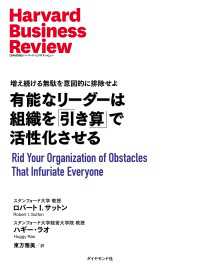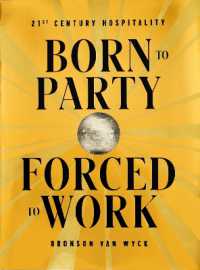- ホーム
- > 洋書
- > 英文書
- > Philosophy
Full Description
About eighty-five years ago, philosophers and literary intellectuals as diverse as Edmund Husserl, George Santayana, and Paul Valéry, aware of the declining influence of Christianity, spoke of "the crisis of Western civilization." In Wretched Aristotle: Using the Past to Rescue the Future, Jude P. Dougherty offers an intriguing reexamination of this crisis in contemporary times. Situating his argument in the context of ongoing debate concerning the nature of the public philosophy that underpins ideas of freedom, Dougherty identifies the essential features of Western culture through a series of interrelated essays. Each essay reinforces the idea that modernity cannot be understood apart from its break with classical antiquity. Wretched Aristotle offers a refreshing historical approach to this issue that will make it appealing to those interested in the mutual influence of science and culture and the role of religion in culture.
Contents
Part 1 I. The Relevance of Antiquity Chapter 2 Chapter 1.Wretched Aristotle Chapter 3 Chapter 2.Tom Wolfe's Epictetus Chapter 4 Chapter 3.Aristotle in North America Chapter 5 Chapter 4. Ora et Labora: Benedict's Legacy Chapter 6 Chapter 5.Ancients and Moderns on the Subject of Property Chapter 7 Chapter 6.The Ontology of the Artifact Part 8 II. The Role of Religion in Society Chapter 9 Chapter 7.The Failure of Positivism and the Enduring Legacy of Comte Chapter 10 Chapter 8.Judicial Decision within the Rule of Law Chapter 11 Chapter 9.Modern Interpretations of Religion: The Legacy of Hume and Kant Chapter 12 Chapter 10.Santayana on the Role of Religion in Society Chapter 13 Chapter 11.Indestructible Islam Chapter 14 Chapter 12.Science and the Shaping of Modernity: The Reciprocal Influence of Science and Culture Chapter 15 Chapter 13.The Use and Abuse of Analogy and Metaphor in Scientific Explanation Part 16 III. Contemporary Moral Issues Chapter 17 Chapter 14.Morality with and without God Chapter 18 Chapter 15.Responsibility: Recognition and Limits Chapter 19 Chapter 16.National Identity Chapter 20 Chapter 17.The Fragility of Democracy Chapter 21 Chapter 18.The Socialist Mind Chapter 22 Chapter 19.The Natural Basis of the Theological Virtue of Hope







